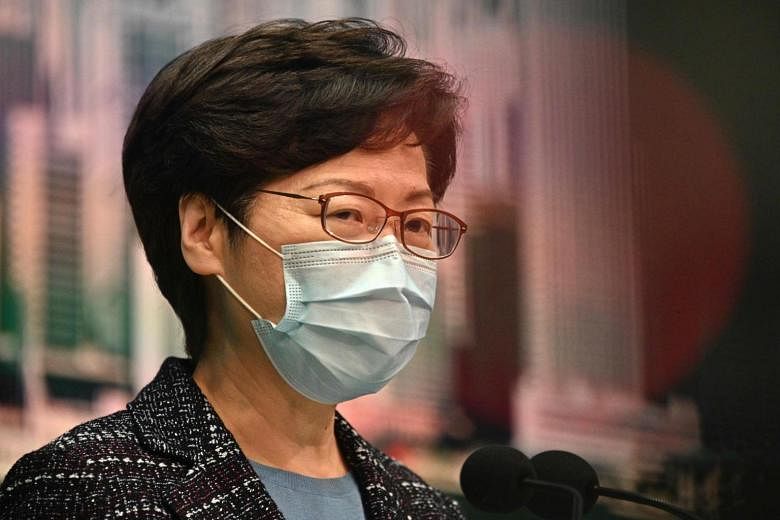HONG KONG - Chief Executive Carrie Lam on Wednesday (April 22) introduced four new faces to her Cabinet following a shakeup that she "categorically" denied had any connection to the administration's apparent power struggle with Beijing's liaison office that surfaced over the weekend.
Flanked by the four new appointees and Secretary for Constitutional and Mainland Affairs Patrick Nip, who will move into the role of Secretary for the Civil Service, Mrs Lam said at a briefing that the reshuffle process had "taken longer than just a few days".
China's state council approved the new official lineup earlier on Wednesday.
Undersecretary for Labour and Welfare Caspar Tsui will take over from Secretary for Home Affairs Lau Kong Wah, while director of electrical and mechanical services Alfred Sit Wing Hang replaces Secretary for Innovation and Technology Nicholas Yang.
Executive director of the Financial Services Development Council Christopher Hui takes over the reins from Secretary for Financial Services James Lau.
Mr Joshua Law's role at the Civil Service will be assumed by Mr Nip, whose post will be taken over by Immigration director Erick Tsang.
Mrs Lam, who was the only one who fielded questions from the media, also expressed thanks to the outgoing officials for serving Hong Kong and the government wholeheartedly.
Some observers believe the moves are a fallout from the government's weekend bungling in explaining the status and powers of Beijing's liaison office.
But this was dismissed by Mrs Lam, who said the reshuffle is aimed at reviving Hong Kong's economy, which suffered last year from more than seven months of protests followed by the ongoing coronavirus pandemic.
"Many people who treat Hong Kong as home and have aspirations hope to help Hong Kong get out of the deadlock," she said. "In the coming two years, I will lead the government in controlling the (Covid-19) pandemic… and rebuilding the economy."
The chief executive's current five-year term ends in June 2022.
The Hong Kong government issued press releases over the weekend that initially appeared to disagree with a declaration last week by Beijing's liaison office that it is not subject to Article 22 of the Basic Law, which prohibits interference in Hong Kong affairs.
But the Constitutional and Mainland Affairs bureau concluded that the liaison office has authority to represent the Central People's Government (CPG) to express views and "exercise supervisory power on major issues such as those concerning the relationship between the CPG and the territory".
The controversy resulted in Mr Nip apologising on social media on Monday (April 20) for the "mistakes, confusion and misunderstanding".
On Wednesday, Mr Nip pledged to "safeguard the core values of Hong Kong civil servants" and to ensure "political neutrality".
His successor, Mr Tsang, said he would ensure that the "few elections coming up" would be "conducted fairly". He added that he would strengthen public education on the Chinese constitution and Basic Law.
Mr Sit, now in charge of innovation and technology, said he aims to groom new talent and attract foreign experts to join Hong Kong's talent pool.
Mr Tsui, who now leads home affairs, vowed to help rebuild Hong Kong after the pandemic, while Mr Hui committed to strengthening the city's financial industry during the pandemic.
Associate Professor Sing Ming, from the division of social science at the Hong Kong University of Science and Technology, said the appointments came as no surprise at all.
"Many of them are existing civil servants, including the one who is going to replace Mr Nip. In a sense, the lack of new bright stars outside of the civil service has betrayed the original intention of the entire principal officials' accountability system, because the system has been set up with an aim to enlist the bright stars in the private sector to brighten and polish the quality of governance."
He pointed out that outgoing Home Affairs Secretary Mr Lau and his successor are both former members of the city's biggest pro-Beijing party, the Democratic Alliance for the Betterment and Progress of Hong Kong.
"It's very clear that meritocracy has been put aside and political loyalty has been underscored, as far as controlling of home affairs is concerned," added Prof Sing.
"The Secretary of Home Affairs is empowered to determine the allocation of resources to various district councils and various community affairs, so it's very clear that Beijing in the last few years has stressed political loyalty in the appointment of this important post."












